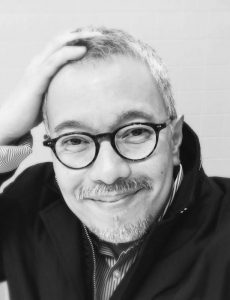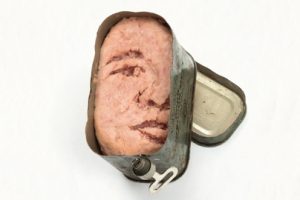
 Ralph Peña has been at the forefront of Asian-American theatre since the early 1980s. He is a founding member and current Artistic Director of Ma-Yi Theatre Company, an award-winning Off-Broadway theatre company that cultivates the development and production of works by Asian-American artists. Peña received an Obie Award for his work on The Romance of Magno Rubio, and is a member of The Ensemble Studio Theater, and The Ma-Yi Writers Lab. In September 2016, Peña received the Filipino American National Historical Society (FANHS) Lifetime Achievement Award.
Ralph Peña has been at the forefront of Asian-American theatre since the early 1980s. He is a founding member and current Artistic Director of Ma-Yi Theatre Company, an award-winning Off-Broadway theatre company that cultivates the development and production of works by Asian-American artists. Peña received an Obie Award for his work on The Romance of Magno Rubio, and is a member of The Ensemble Studio Theater, and The Ma-Yi Writers Lab. In September 2016, Peña received the Filipino American National Historical Society (FANHS) Lifetime Achievement Award.
At the moment, he is gearing up for tech week on an exciting new work he has directed: Among the Dead, written by Hansol Jung, a playwright and director from South Korea.
You've been in theatre since 1980, when you started as a student in political theatre. Please tell me a bit about that first production and how it all came to be.
Ralph Peña: The University of the Philippines was a hotbed of student activism during the Marcos years, much like Berkeley in the USA in the 1960s. Reagan was praising Marcos while all these terrible things were going on... in response, we students started Bodabil, which means "vaudeville", and we used the vaudeville form in a street theatre format to tackle political themes.
There was one year there was a beauty pageant, Miss International, being held -- so we held our own beauty pageant outside of it. We had Miss Imperialism --- all the "Isms" were in it. The host of Miss International, I think it was Bob Barker, came out and so did all the press. They started covering us instead of the pageant inside.
We were asked to perform as Cory Aquino [the 11th President of the Philippines, and the first female president in Asia] gave a speech in front of 1 million people. We went into prisons, performed for different communities. It was good because it taught me that theatre is so much more than entertainment.
"Theatre is more than entertainment" -- I like that. I think audiences agree, whether they put it in those words or not, that theatre means much more than just being entertained.
It's not easy to practice, though, especially in the United States. It's just a commercial market pool these days. The funding dries up, so it kind of kills the impulses to be political and have a message.
So, it's like theatre is kind of a rich person's world.
Theatre is a luxury product now. Broadway tickets going for $60, $75, $125 now -- who has access to it? And also, if you spend $1 million putting on a show, you want everybody to come, so rarely do you have political themes in a show. What we have instead is a lot of musicals. It's the defanging of American theatre. We have no bite.
About the new work, Among the Dead, I read that there are three different time periods represented in the show. How did you take on directing such a unique concept?
[Playwright Hansol] Jung did it in her text. The map was laid out in the play. My job is how to translate it with action and image.
What I liked about the play was I didn't know how to do it. It was a challenge to take on something new. But that's all right -- I don't want to do plays I already know how to do.
There is a young woman from America going to Seoul to get her father's ashes in 1975. There is a Korean comfort woman in 1950, waiting with her daughter for the man who fathered her. In 1944, there is an American soldier fighting in Myanmar. There is a lot of use with lights to differentiate between the three places and time periods while they are all on stage...
They are all three on stage at the same time?
Yes.
I don't think I have ever seen that before. This is interesting -- I can't wait to see it. I read they are brought together by Jesus.
Jesus is the catalyst between all these time periods. He functions not in a religious context, but as nature righting its wrongs.
There is rereading of family history, and new revelations come through that rereading. So all the time periods sort of melt together.
 It's a dark comedy. Did it start out that way, or did the humor become evident as you went along?
It's a dark comedy. Did it start out that way, or did the humor become evident as you went along?
Both. There were some funny parts already written in by Hansol, and then we found pockets of humor as we went through the process.
Tell me a bit about the Ma-Yi Writers Lab. It's the largest collective of Asian-American writers in New York. Or even the world?
Well -- I like to say "the known universe". You can only truly be an Asian-American writer in America. So "the known universe" works for that.
The Writers Lab launched in 2005. It is part of the evolution of the company. We wanted to make sure that plays live beyond their first production, that these plays go out and get produced. We wanted to be upstream and productive, rather than downstream and reactive. There are 29 members. They create about 95 percent of the Asian-American plays in the USA. We produce three plays a year, only by Lab members.
This season, we began a play that we took back to Manila -- it's our children's play (The Wong Kids in the Secret of the Space Chupacabra Go!). It has gone to Boston, Minneapolis, and here in New York as well.
If you had one sentence to sum up what you hope to tell an audience coming to a Ma-Yi production for the first time, what it would be?
That's a lot to put in one sentence.
I know -- sorry, I just thought of that as I was saying it.
No worries. I have it. "Check your preconceptions at the door."
Performances of "Among the Dead" begin November 6 at HERE.